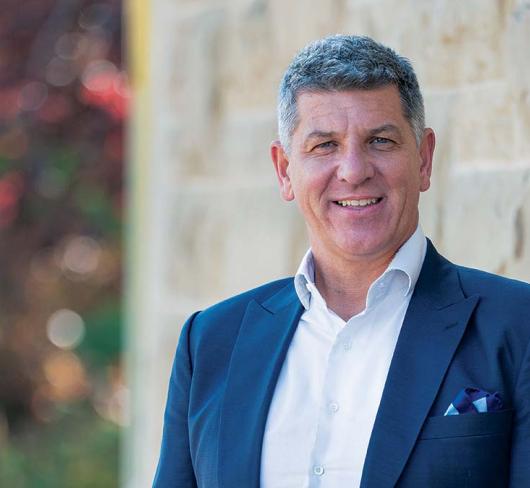
Professional Learning with You at the Centre
This issue of Voice is about the changing nature of professional learning. Effective professional learning is about you and your needs, and the needs of your students. It is learning you choose and direct for yourself, and it occurs every day in the course of your work.
We live in an information age, a time of rapid technological change and continual transformation of what we think we know to be true. Like everyone else in today’s society, schools and teachers struggle to keep pace. Education must not only provide students with a body of facts; it must also give them the tools to solve problems creatively and to communicate their thinking. Students must learn how to find the information they need, and to synthesize, analyze, and critique it.
The changing expectations of and increasing demands on students fall squarely on the shoulders of teachers. Improvement in education depends on teachers, and change will not occur without changes in teacher practice. Like their students, teachers need to be lifelong learners. They need to enhance their practice to increase their ability to meet students’ needs.
WHAT KIND OF LEARNING IS MOST EFFECTIVE?
There are several different types of professional learning. Some training responds specifically to the priorities of principals, school boards, and the Ministry of Education. ETFO believes that to be effective, professional learning must also take into account teachers’ priorities and must be directed by teachers. Demanding that teachers change their practice or expecting them to copy and adopt new methods uncritically works only if the teachers have determined that the new practices are more effective and will improve their students’ learning.
When teachers engage in professional learning that is voluntary and specific to their needs and those of their students, educational change and systemwide improvement will occur. Change also comes about when teachers take what they have learned into the classroom and put it into context, into daily practice.
Professional learning as defined, supported, and encouraged by ETFO has you the teacher at its core. It is learning you choose based on your needs in the classroom. It is learning that motivates you to do something differently. At its very best, it changes you: your values, belief system, attitudes, and behaviours combine with new knowledge and skills to change your teaching.
WHAT MAKES EFFECTIVE PROFESSIONAL LEARNING?
In this issue of Voice, you will read stories by teachers who took part in a variety of professional learning activities that inspired, excited, and changed them. The activities and programs they write about are examples of the kind of professional learning that research has shown to be successful.1
Effective professional learning respects and incorporates the knowledge that you already have in a wide variety of areas: pedagogy, children’s emotional and physical development, and instructional approach. It allows you to incorporate new skills into your existing practice. It provides an effective mix of theoretical and practical knowledge that you can take into the classroom when you need it. It is the kind of learning you will experience as a participant in an ETFO professional learning program. ETFO’s Summer Academy offers this kind of approach, whether the topic is literacy, numeracy, arts education, or daily physical activity, as in Fanitsa Housdon’s article on page 38.
Effective professional learning involves inquiry and experimentation. You learn how to ask questions about your classroom practice, how to collect data, and how to determine if what you’re doing is improving student learning. If you determine that your practice is not enhancing student learning, you are offered effective programs that suggest possibilities for change. For example, Brian Harrison and a small team at his school have used lesson study to ask questions about their teaching (page 49). In the Kawartha Pine Ridge District School
Board, teams of classroom and special education resource teachers are working together and experimenting with integration as a way of enhancing student success (page 29).
Effective professional learning respects the adult learner. It adapts to all the ages and stages of teachers’ careers – including the needs of occasional teachers – and recognizes their many different roles. It allows you to choose what issues or topics best suit your needs at any particular stage of your career. ETFO’s Strategies for Surviving While Smiling (page 36) meets the needs of new and occasional teachers. PD on the Fly, (page 33) devised by the Greater Essex Occasional Teacher Local, allows teachers to learn on their own schedule. Rhea Perreira-Foyle, a participant and facilitator in ETFO’s Reflections on Practice program also shows how technology can assist in allowing you to learn with others outside of your school (page 31).
SHARING YOUR KNOWLEDGE
If we are to be accountable as a profession, then we must be able to explain what we do and why we do it to our colleagues, and to students, parents, school administrators, and the public.
Sharing our professional learning with each other is one of the best means of creating new knowledge and of changing our practice to enhance student success. Collegial collaboration allows us to move from theory to practical application in ways that make sense in our classrooms. It allows us to fine-tune practice to achieve better outcomes. Collaboration can take the form of professional learning communities, as described by Pat Milot (page 22), or grade-team planning as illustrated by Deborah Pitblado and her colleagues (page 47). It can also take the form of small teams of teachers working at the same school, as illustrated by the book club at Armitage Village Public School facilitated by Joanne Myers (page 44).
Every teacher is a leader in her or his classroom. But leadership need not be confined to the classroom or to the more traditional route of school administration. Sometimes, as Susan Drake and her colleagues found (page 12), leadership isn’t immediately recognized by those who engage in it. Leadership opportunities abound. Teachers can be leaders in their school working with colleagues. They can be leaders in ETFO in areas of professional development, professional relations, collective bargaining, and equity. Mini Dawar used the leadership skills she polished at ETFO programs to make a difference in her school (page 18). There are leadership opportunities in district school boards, at faculties of education, in the Ministry of Education, and at universities. Ruth Dawson and Jane Bennett share the stories of teachers who have taken on a variety of these leadership roles across the province (page 14). As Sukayna Dewji shows, there are leadership opportunities for teachers wanting to share their skills with colleagues around the world (page 26). Teachers who are developing and broadening their leadership skills provide the school and the education system with an important perspective that connects classroom teacher needs to training and resources.
YOU HAVE MANY CHOICES
Effective professional learning offers a variety of content, styles, and formats. In this issue, you will find accounts by teachers who have broadened their horizons. All are professionals who took a risk, opened up their classrooms and their practice, agreed to share their knowledge with colleagues, and have decided to share that process with you.
We thank the Ministry of Education for providing funding that helped make it possible for us to bring you their stories and to encourage you to continue your lifelong journey of professional learning. We hope you enjoy reading about their experiences.
1 Lynne Hannay, Ron Wideman, and Wayne Seller. Professional Learning to Reshape Teaching. Toronto: Elementary Teachers Federation of Ontario, 2007.
